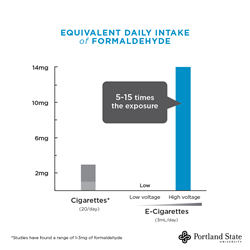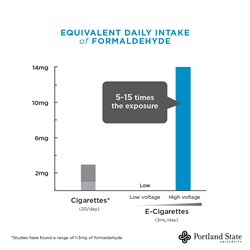Portland State Researchers Uncover High Levels of Hidden Formaldehyde in E-cigarette Vapor


Portland, Oregon (PRWEB) January 21, 2015
In a study published Jan. 22 in the New England Journal of Medicine, Portland State University researchers reveal that e-cigarette vapor can contain hidden formaldehyde at levels five to 15 times higher than regular cigarettes.
Researchers have long known that formaldehyde and other toxic chemicals are present in cigarette smoke, and initially, e-cigarettes were hoped to be without such dangers because they lack fire to cause combustion and release the chemicals. But now, many e-cigarettes can substantially increase the heat they produce.
“The popular ‘tank system’ e-cigarettes allow users to really turn up the heat and deliver high amounts of vapor, or e-cigarette smoke,” said David H. Peyton, PSU chemistry professor and lead researcher. “Our research shows that when heated at higher temperatures, e-cigarette juices can vaporize and form large amounts of ‘hidden formaldehyde,’ five to 15 times higher than the amount of formaldehyde in traditional cigarettes.”
Formaldehyde is a known human carcinogen. It is a colorless, strong-smelling gas, commonly used as an adhesive in building materials such as particle board and in mortuaries as an embalming fluid. Formaldehyde is also used as an industrial fungicide, germicide and disinfectant.
E-cigarette devices and their liquids are not regulated by the Food and Drug Administration (FDA). A lack of regulation means that companies are not required to disclose their manufacturing process, their ingredient list or any scientific data to the FDA.
“E-cigarettes are becoming more complicated and more like real cigarettes by the day,” said PSU Professor James F. Pankow, who participated in the study. “They use extremely high temperatures to vaporize their fluids and contain high levels of chemical additives. Some include materials derived from tobacco, and that’s in addition to the nicotine. No one should assume e-cigarettes are safe. For conventional cigarettes, once people become addicted, it takes numerous years of smoking to result in a high risk of lung cancer and other severe disease; it will probably take five to 10 years to start to see whether e-cigarettes are truly as safe as some people believe them to be.”
In April 2014, the FDA proposed federal restrictions that would bring e-cigarettes under the same regulation as tobacco, outlined in the 2009 Family Smoking Prevention and Tobacco Control Act. The proposed federal restrictions are still under review and no schedule has been set for adoption.
“Our overarching concern about e-cigarette use is the lack of research on health risks,” said Jackilen Shannon, a cancer prevention expert with the Knight Cancer Institute at Oregon Health & Science University. “This study represents progress toward providing some much-needed data on the make-up of the smoke from some e-cigarettes.”
Peyton and his colleagues agree that more research must be done to evaluate the health risks of e-cigarettes.
“E-cigarettes present their own unique chemical properties, and now that we have methods that can detect this hidden formaldehyde, we can look for other toxins that might be posing a risk to e-cigarette users,” said Robert Strongin, a PSU chemistry professor, who also contributed to the study.
Peyton is a professor in the PSU Department of Chemistry and chief scientific officer/co-founder of DesignMedix, Inc., a drug discovery and drug development company in Portland, focusing on therapies for infectious diseases. He is author of more than 60 peer-reviewed publications, which range from medicinal chemistry, to biochemistry, to the chemistry of tobacco smoke particles.
Pankow is the author of more than 150 peer-reviewed publications and four books. He received the 2005 Haagen-Smit Prize for his groundbreaking research on the formation of particles in the atmosphere; particles play a fundamental role in controlling the delivery of nicotine and carcinogens from cigarette smoke. He has a dual appointment in the PSU Department of Civil and Environmental Engineering and in the PSU Department of Chemistry.
Strongin is a professor in the PSU Department of Chemistry. His peer-reviewed publications have been cited over 5,000 times. He is an expert in the molecular basis of oxidative stress, disease diagnostics and drug design.
More information about this research is available at the New England Journal of Medicine.
Additional comments are available from:
American Cancer Society Cancer Action Network, Inc., Lauren Walens, Manager, Media Advocacy, lauren.walens(at)cancer(dot)org, 202-661-5763, 734-904-2181 (mobile)
Oregon Health & Science University, Knight Cancer Institute, Elisa Williams, Associate Director of Communications, 503-494-8231, willieli(at)OHSU(dot)edu
About Portland State University (PSU)
Oregon’s urban research university, recognized for excellence in sustainability and community engagement, is located in the heart of downtown Portland. PSU’s motto is “Let Knowledge Serve the City,” and it offers more than 200 degrees with opportunities to work with businesses, schools and organizations on real-world projects.
###
Related Chemistry Press Releases